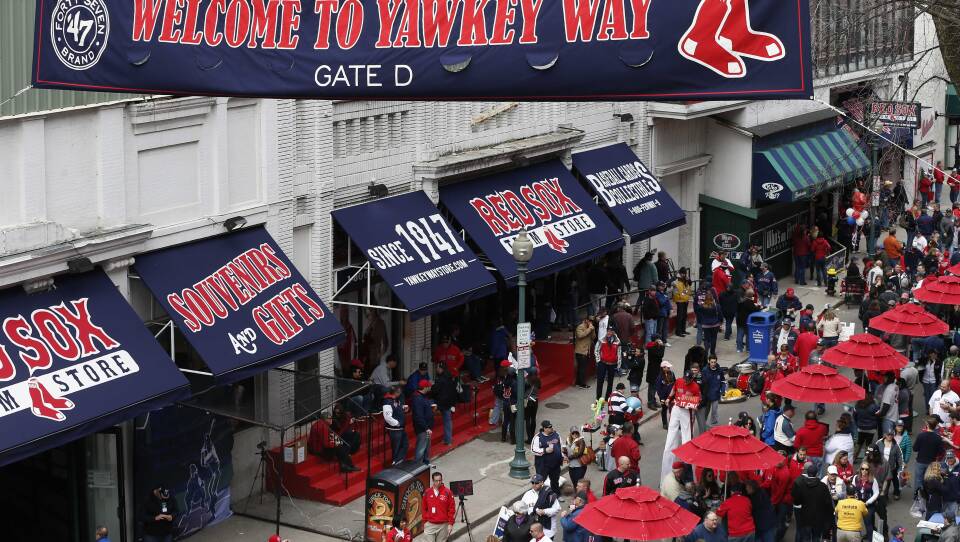A decision is expected this week on whether Yawkey Way, the street where Fenway Park sits, will be returned to its original name of Jersey Street. The current street name has honored former Red Sox owner Tom Yawkey since 1977. But, now, some say Yawkey was a racist. Others say Yawkey did plenty of good, and a foundation also named after him opposes the move. The controversy got listener Newell Flather from West Newton curious about something, and he reached out.
"Hot in the news right now is the Yawkey Way/Jersey Street controversy. It seems to me that if we’re gonna switch back to Jersey Street, we ought to know more about the origins of Jersey Street. Where that name comes from."
To understand the origins of the street’s name, you have to go back. Way back to the mid-1800s, and an audacious plan to transform the marshland of the Back Bay into a grand, modern neighborhood.
"Boston, as a small city and somewhat provincial in the 19th century, realized in some way that this was a major feature," said Anthony Sammarco, author of more than 80 books on the history and development of Boston. "They wanted to emulate London and Paris and the basic grid plan of the mid-19th century grand European cities."
Sammarco says the aim was to attract Boston’s elite to buy up the land and bring the city’s new ambitions to fruition. The long streets running east-west were designed to follow the contours of the Charles River, with names that referenced the Boston's Puritan roots.
"These streets themselves were to echo Boston’s colonial past," said Sammarco. "Newbury Street and Beacon Street represented, in some ways, old Boston.”
But the cross streets that completed the grid were to represent the city’s aspirations for the future. Adding a dash of elegance, they were named in alphabetical order: Arlington, Berkeley, Clarendon, Exeter, Fairfield, Gloucester and Hereford.
"They wanted to have something that was not only aristocratic in sounding, but also aristocratic in name," explained Sammarco.
It was an era of renewed relations with England, the American Revolution now 75 years in the past. And what could be more aristocratic than, well, the aristocracy? And so, each alphabetical street was named after a British Earl.
"They were trying to create a connection to the aristocracy of Britain," said Sammarco. "Many of America’s wealthiest families had daughters that were courting a title. And in that instance the titles themselves were even used on our streets."
And the progression continues the other side of Massachusetts Avenue, developed a few years later, though not in a strict grid. Ipswich. Jersey, Kilmarnock, and Miner. All alphabetical. All British Earls. Sammarco says these streets were named more for the titles than the people who held them, but you may still be wondering who the Earl of Jersey was when the street was first christened.
"So, that would have been the 6th Earl of Jersey, George Augustus," said William Villiers a.k.a. Lord Jersey, the 10th and current Earl of Jersey, who I tracked down on Twitter and — to my great surprise —responded. "So, my great, great, great grandfather."
For the record, Jersey is one of Great Britain’s islands in the English Channel and also the name sake of the state of New Jersey.
"There are lots of places associated with our family name in England and Wales and I think in Australia, but we had no idea about Boston at all until you got in touch," said Villiers.
Lord Jersey says that, today, being an Earl doesn’t carry the power or responsibilities it once did. Sure, he has the family estate — and legacy — to look after for future generations.
"But there isn’t a club of peers that hang out on the banks of the Thames," he said. "There isn’t a shindig where we all put on our robes and drink fine wine, I’m afraid. Certainly not one I’ve been invited to," he added, laughing.
Lord Jersey described himself as a "regular guy" who is, frankly, “pretty dull.” He works and spends time with his wife, running after his four kids, gardening and following sports, mainly rugby, though, now he says he has a new interest.
"Having learned this connection, I think I’m gonna have to become a Red Sox fan," he said. "I’m more of a cricket player than a baseball player, but I’ll give it a whirl."
As for whether his new team will be once again playing their home games on a street named after his home turf? We’ll soon find out.
My thanks to listener Newell Flather from West Newton whose question led to this story. What's yours? Email me at CuriosityDesk@wgbh.org . I might just look into it for you.





